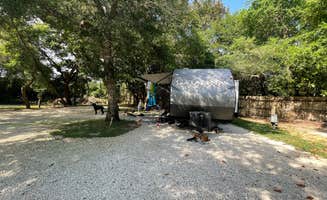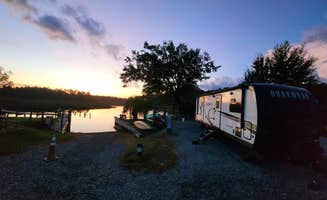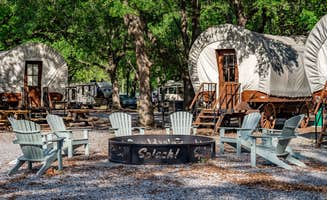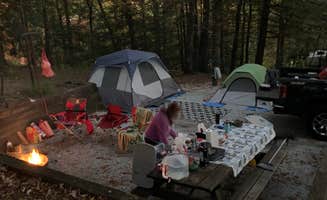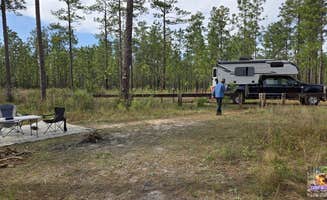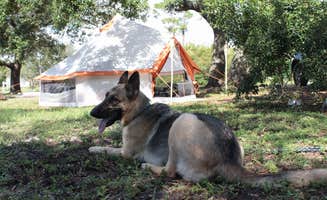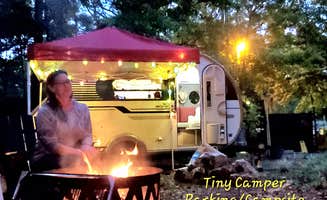Camping sites near Navarre Beach, Florida sit in a subtropical climate zone with summer temperatures regularly reaching 90°F with 70-80% humidity. Most campgrounds maintain multiple pet-friendly areas with designated dog beaches and separate fenced dog parks for off-leash play. The transition between spring and summer camping seasons occurs around mid-March when water temperatures in Santa Rosa Sound reach 70°F while Gulf waters remain slightly cooler.
What to do
Beach fishing: Fort Pickens Campground offers multiple shoreline access points with productive surf fishing. The area supports both bay and gulf fishing options with different species available. "We were less than a 10 minute walk from the beach and walked about 30 minutes to the old fort. The showers were separate from the bathrooms and what you might expect for a beach, the water was nice and hot," notes one visitor who enjoyed fishing the area.
Kayaking: The Santa Rosa Sound provides protected paddling with minimal boat traffic at Navarre Beach Camping Resort. Kayaks can be launched directly from the small bay beaches at several campgrounds. "We enjoyed the pool and the pier. The only reason I cant give it 5 stars is the laundry room and the shower rooms could have been better. 3 out of 6 dryers were broke so it made laundry a bit challenging to do," mentions a camper who spent time kayaking from the resort.
Military history: Fort Pickens contains extensive historic fortifications with ranger-led tours available during peak season. The naval aviation museum near Pensacola offers free admission and displays related to local military history. A visitor notes, "We not only saw the fort, but the Blue Angels practice," highlighting the connection between outdoor recreation and military heritage in the area.
What campers like
Private beaches: Many campers appreciate the private water access at Emerald Beach RV Park with fewer crowds than public beaches. These smaller beaches offer convenience without fighting for parking at main public access points. "Friendly staff, clean campground, fun little dog beach, great fishing pier and small beach," writes one reviewer who enjoyed the private access.
Concrete pads: Level, stable concrete parking pads are highly rated features at several campgrounds, particularly important during rainy periods. These reduce setup time and eliminate concerns about sinking into sand. "Site 50 is level with full hookups. Only issues is ATT and TMobile service bad but not park's fault. However, their WiFi was almost useless. One big plus is they allow rig washing for free," a camper at Emerald Beach RV Park mentions.
Shade options: Blackwater River State Park provides substantial tree cover for hot summer camping. Many coastal campgrounds have minimal natural shade, making tree-covered sites especially valuable. "What sets this campground apart is the numerous trees on the property. I visited on a cool, cloudy day in February, but I imagine the shade from the trees would be very welcome in the summer," notes a camper at The Hideaway Retreat.
What you should know
Hurricane season impacts: Camping from June through November carries risk of evacuation notices, particularly at gulf-facing sites. Sites farther inland provide more weather security during these months. "Hurricane season (June through November) can affect camping plans, with occasional evacuation notices for coastal sites."
High demand periods: Spring break (mid-March through early April) sees extremely high occupancy with limited last-minute availability. Waterfront sites at popular campgrounds often book 11 months in advance. "This is a busy park due to beaches and the actual old fort Pickens buildings, but the campsites were fairly peaceful," notes a Fort Pickens camper about the crowding patterns.
Military noise: Santa Rosa RV Resort and other properties near military installations experience occasional training noise. Helicopter flights and weapons testing can occur late into night hours. "A couple nights, our camper shook. Not the resorts' fault obviously, but just know in advance if you hear loud noises, that's what it is," warns a camper about the nearby military testing.
Tips for camping with families
Dog-friendly beaches: Several campgrounds offer private pet beaches where dogs can play off-leash in designated areas. These specialized beaches reduce conflict with other beach users. "You can't have a campfire at your site but there is a charming 'community' fire pit available, with cornhole and some other games surrounding it (my grandson loved this feature). You can rent kayaks and paddle boards at the campground ($35/half day)," reports a visitor to The Hideaway Retreat.
Community gathering spaces: The Hideaway Retreat features centralized activity areas with games and fire pits. These spaces foster social interaction among campers, particularly valuable for families. "The little park in the center has games and a firepit and is lit up at night for folks to gather, and they do; families play foosball and ping pong while others sit by the fire. Very dog-friendly," shares a camper.
Tent site selection: Highway noise affects some tent sites significantly more than others at beachside locations. Request sites furthest from main roads when booking tent sites. "If you are tent camping DO NOT let the put you in a site near the highway - the car noise is VERY loud & you will not sleep (I ended up sleeping in my minivan and then moved sites the next day)," advises a tent camper at The Hideaway Retreat.
Tips from RVers
Traffic challenges: Highway 98 presents difficult entry/exit for large rigs during peak traffic hours. Many RVers recommend avoiding noon to 6pm for campground arrivals or departures. "Be aware that FL98 is an incredibly dangerous highway and driving in/out of the campgrounds with or without a trailer is horrendous. We saw several bad accidents every single day," cautions an RVer staying near Navarre.
Rig size limitations: Tree canopies at several campgrounds create clearance issues for taller RVs. Avalon Landing RV Park accommodates larger rigs with fewer overhead obstacles. "There's a lot of trees, make sure you're an expert if hauling a trailer or driving a large RV because space is tight and the tree canopies are low. Also make sure you explain exactly the dimensions as so they may place you best based on size," advises a camper at The Hideaway Retreat.
Utility placement: Some sites require extra-length hoses and cables due to unusual hookup locations. Water and electric connections are sometimes positioned at the front of sites rather than mid-point. "Sewer, water & electric were all at front of site, so had to pull into access road to dump," notes a reviewer describing hookup challenges.





